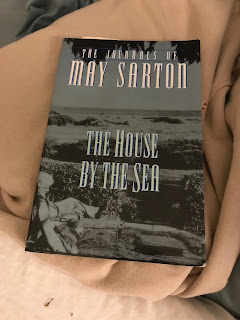 |
| Shadows on the Lake photo by amy |
"You remember, when Queen Dido offers Aeneas hospitality, she says: Having known misery, I have learned to pity the miserable. Our poor wood-carrier is like Queen Dido." (Euclide to Cecile in Willa Cather's Shadows on the Rock)
I'm going to start this post with an insight about myself I didn't like discovering and I think probably reflects poorly on our society at large. Early on in Shadows on the Rock by Willa Cather, a poor, poorly-tended child named Jacques says to the his friend Cecile: "Sometimes sailors like children too." And a little later, he begins to recount an experience he had with a priest. Both of these happenings ended up being positive, helpful experiences for Jacques. But before I knew what happened, I automatically assumed that both occurrences were going to involve some kind of abuse. Why? I've never been the victim of abuse. I have no reason to make that kind of assumption. All I can think is that as a society, we are so inundated with news about these kinds of abuses that it has become a go-to assumption for someone even as naïve as I am. Is this a poor reflection on the world we inhabit or on the news to which we are constantly subjected? I don't watch or read the news, but I still have these over-arching negative impressions so imprinted in my mind that these are the conclusions I reach with no evidence. This makes me sad.
What makes me happy, though, is a novel like this one. I love Willa Cather. This is the fourth of her novels I have read. I absolutely love her ability to transport me into the places and times of her novels. You don't read Cather for the plot; you read Cather for the perfect and perfectly beautiful descriptions of both the characters and the settings. While not a lot happens in the novel, the plot does resolve nicely for someone like me who likes a happy ending. I grew to love the characters: Cecile Auclair, the twelve year old daughter of Euclide, Count de Frontenac's hand-chosen apothecary, who is also a lovely character; the Count himself and old Bishop Laval, both of whom love and care for their people in understated, humble ways; sweet, damaged Blinker and little Jacques Gaux; Father Hector, the bishop to the wild ones, and Pierre Charron, one of the first true Canadians of European descent, who loves his land as few others do and makes a point of sharing that love with Cecile.
Since finishing Shadows on the Rock, I have been to the bookstore and to Amazon and to the library and acquired about 10,000 other books and have not been able to settle in to read ANY of them. What to do, what to do? Maybe another Cather? We'll see.



5 comments:
I am a big fan of Shadows on the Rock. I think it is kind of uncharacteristic of most of Cather's other novels. To me it seemed like it could be a good middle school book, or at least I kept thinking that I probably would have liked it in middle school.
I agree about the reading level. I'm reading Lucy Gayheart right now, and so far it seems to be more similar to Shadows than to her other work. My Antonia is one of my all time favorite books. I also enjoyed O Pioneers! and Death Comes for the Archbishop. I read Sapphira and the Slave Girl in college but remember none of it. I haven't read The Professor's House but will put it in my massive TBR pile.
Love to read Willa Cather review in book blogland! Particularly as this is one I've not read yet. By the way, The Professor's House is simply wonderful.
Wonderful post. Makes me want to read what you are reading. I would say if you are on a Cather roll, go with more Cather. Indulge.
Thanks! I am reading Lucy Gayheart by Cather right now and also loving it, but it's so different from Shadows, and they are both so different from her other works! I'll pick up The Professor's House next.
Post a Comment